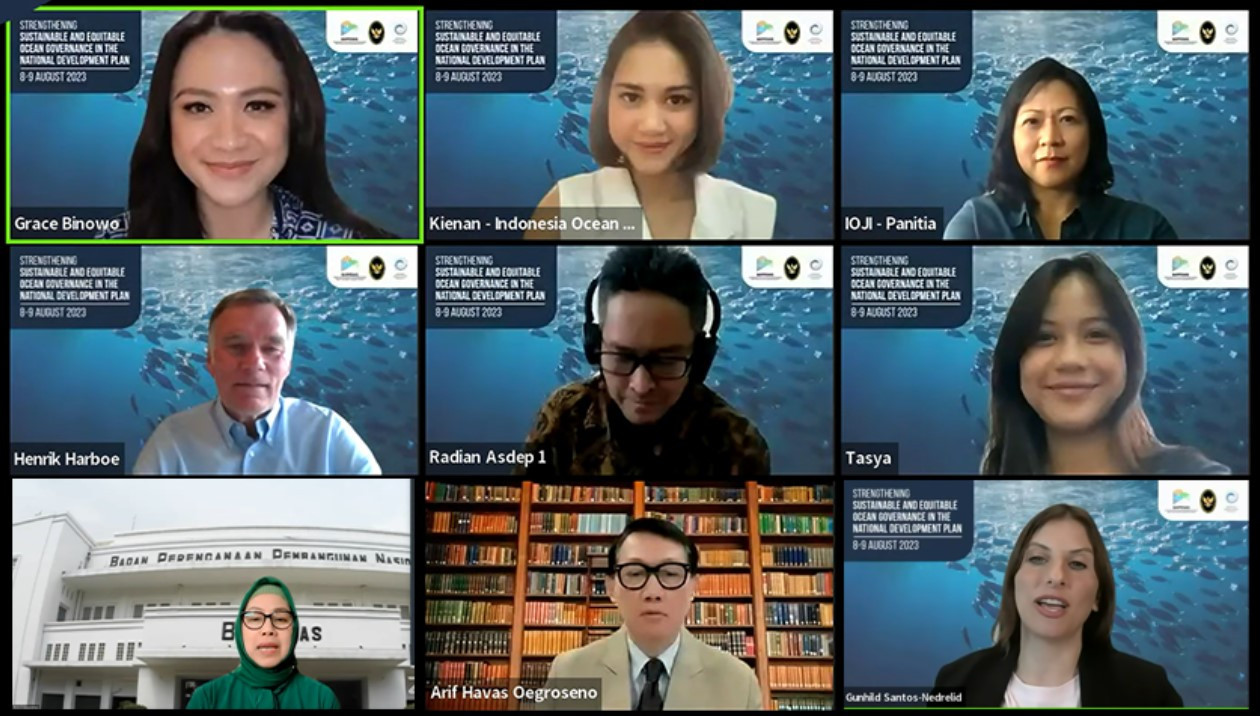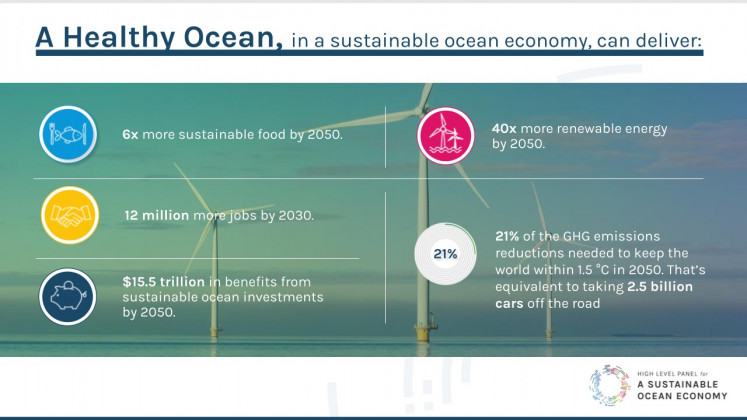Popular Reads
Top Results
Can't find what you're looking for?
View all search resultsPopular Reads
Top Results
Can't find what you're looking for?
View all search resultsBlue Economy Development Must Include Sustainability and Justice Principles
Blue economy and ocean justice concepts need to be treated as a reference point for marine and fisheries policies, which simultaneously go hand in hand with three principles of effective protection, sustainable production, and equitable prosperity.
Change text size
Gift Premium Articles
to Anyone
B
lue economy and ocean justice concepts need to be treated as a reference point for marine and fisheries policies, which simultaneously go hand in hand with three principles of effective protection, sustainable production, and equitable prosperity. This idea was implied in the two-day seminar on Strengthening Sustainable and Equitable Ocean Governance in the National Development Plan, organized by the National Development Planning Agency (Bappenas), the Coordinating Ministry for Maritime Affairs and Investment, and the Indonesia Ocean Justice Initiative (IOJI), Wednesday (9/8/2023).
The urgency to incorporate sustainability and justice aspects has been outlined in the National Long Term Development Plan (RPJPN) 2024-2045, as well as the National Medium Term Development Plan (RPJMN) documents. According to data collected by Bappenas, the sector has the potential to contribute as much as US$ 256 billion of Indonesia's total annual gross value and could be the key to food security, increase in investment, ecotourism, and more.
On the second day, attendees were able to hear from more esteemed speakers, including Gunhild Santos-Nedrelid from the Norwegian Embassy, Acting Director of Maritime Affairs and Fisheries of Bappenas Dr. Sri Yanti, Norwegian Sherpa for the High-Level Panel for a Sustainable Ocean Economy Henrik Harboe, Arif Havas Oegroseno, Indonesian Ambassador to Germany, and Assistant Deputy for Law and Maritime Agreements of the Coordinating Ministry of Marine Affairs and Fisheries Radian Nurcahyo.
In her opening remarks, Gunhild emphasized the similarities of Norway and Indonesia, with both countries having a deep relationship with the body of water surrounding them respectively. She added that the world can no longer avoid the issues that have plagued the ocean because of the climate crises, especially since Indonesia is placed to have a front view on how the situation has deteriorated rapidly.
Despite obstacles, she is confident that countries need a comprehensive approach to ocean management covering all areas of the ocean in international jurisdiction as a key tool, drawing examples from initiatives that have been implemented in Norway, using education among other methods.
During the panel discussion, Henrik cautioned of what could happen if the state of the ocean worsens. He warned that the decline in ocean health could cost the global economy more than US$400 billion annually by 2050, coupled with other issues that may arise because of overfishing, pollution, and acidification. He revealed that biodiversity of the open ocean has declined by 50 percent over the past five decades.
“More than three billion people rely on food from the ocean. The ocean also plays a crucial role, it stabilizes the climate. Around 25 percent of CO2 emissions from human activities are absorbed from the ocean, and the ocean also absorbs 93 percent of the heat caused by global human activity,” he said.
However, he did congratulate Indonesia with the initiatives and the seminar, which shows the country’s determination and commitment to finding a solution for the future. He emphasized the need for international cooperation towards one goal; to manage 100 percent of ocean area sustainably throughout the planet using a holistic approach. Indonesia and Norway, along with 15 other world leaders belong to a panel to achieve a sustainable ocean economy. He also revealed that the panel’s plan is underpinned by three areas; knowledge and science, which turned to policy, and is expected to turn into action. He added that the latter is not an easy feat.
He explained that they have produced what is called “Blue Paper”, which then became condensed to three Special Reports for policy advice. After identifying the gaps and obstacles, along with how to overcome them, the panel is able to publish Ocean Solution Reports, which then can be implemented to create transformations in the community. This was proposed to be a guide or roadmap that can be achieved by Norway by 2025, and the Scandinavian country urged others, including Indonesia, to be able to follow in order to achieve the same feat by 2030.
Radian Nurcahyo, as one of the representatives of Indonesia, was able to report on how the programs for better ocean management will be implemented in Indonesia. Going on the Indonesian Ocean Policy (KKI) compared to the Key Performance Indicators (IKU) side by side, it will be a baseline to measure the transformation in the future.
In addition to his position as the Indonesian Ambassador to Germany, Havas is also the Sous-Sherpa for the Ocean Panel. He attested that Indonesia’s National Sustainable Ocean Plan is based on The United Nations Convention on the Law of the Sea (UNCLOS) 1982, KKI and the Blue Economy Roadmap produced by Bappenas.
“I was involved in the establishment of the Ocean Policy, it took us about one year or so, and we brought in many people and/or players at the local levels; NGOs, local governments, as well as at the level of different ministries,” he revealed. He added that when he had the opportunity to be able to help draft the Ocean Policy, he drew experiences from other countries for the framework.
He also shared that Indonesia is the only country in Southeast Asia that actually has a framework for the blue economy, which has grown more essential to Indonesia’s economy and national development throughout the years. This year, Indonesia launched the Blue Economy Roadmap, and he also showed some targets set forth by the government moving forward.
Focusing on the restoration of mangrove forest, restoration of biodiversity, designation of Marine Protected Areas (MPAs), along with reduction of waste and pollution. He revealed that the international community has assisted the countries, such as Germany, United Arab Emirates in terms of funding, Norway, Denmark, and Japan.
All speakers agreed that economic growth needs to be accompanied by effective environmental and social safeguards to ensure sustainability and equitability. The potential for developing the marine economy faces serious threats. Globally, the triple planetary crisis, marked by devastating climate change, pollution and loss of biodiversity, threatens the global economy and exacerbates poverty levels.
In addition to sustainable aspects, marine economic development must also not forget the aspect of justice. The concept of a blue economy that is defined too narrowly can sacrifice the interests of marginalized communities who depend on marine resources for their survival.
This article was published in collaboration with IOJI, Ministry of National Development Planning/Bappenas, and Coordinating Ministry of Maritime Affairs and Investment












